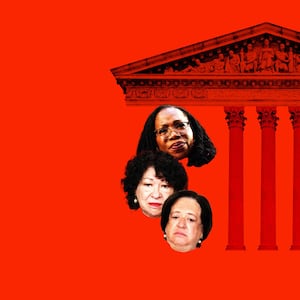The Supreme Court was hit by a flurry of damaging new leaks Sunday as a series of confidential memos written by the chief justice were revealed by The New York Times.
The court’s Chief Justice John Roberts was clear to his fellow justices in February: He wanted the court to take up a case weighing Donald Trump’s right to presidential immunity—and he seemed inclined to protect the former president.
“I think it likely that we will view the separation of powers analysis differently,” Roberts wrote to his Supreme Court peers, according to a private memo obtained by the Times. He was referencing the D.C. Circuit Court of Appeals’ decision to allow the case to move forward.
Roberts took an unusual level of involvement in this and other cases that ultimately benefited Trump, according to the Times—his handling of the cases surprised even some other justices on the high court, across ideological lines. As president, Trump appointed three of the members of its current conservative supermajority.
Such was the case in March that debated whether Colorado, or any state, had the authority to remove an official from a federal ballot. Roberts persuaded the other justices to make their opinion—that states could not unilaterally drop a federal candidate from the ballot—unsigned to authoritatively signal their unanimity, according to the Times.
The judges agreed, until the conservatives sought to include an additional proposition that mandated anyone seeking to enforce the Constitution’s ban on insurrectionist candidates get congressional approval. Four justices—Sonia Sotomayor, Elena Kagan, Ketanji Brown Jackson, and Amy Coney Barrett—thought that idea went too far, and wrote concurrences in disagreement. Roberts himself wrote the majority opinion.
Roberts also took charge of the court’s ruling that declared the government went too far in charging those who stormed the Capitol on Jan. 6.
He had initially assigned the case to Samuel Alito but abruptly took it over himself days after the Times revealed Alito’s wife Martha-Ann hung an upside-down U.S. flag—an emblem of the “Stop the Steal” movement, and propagated by some Jan. 6 rioters—outside his home, according to the Times. It was unclear whether the two episodes were linked; none of the justices answered the Times’ questions
The switch, however, was unusual among court standards. Such instances usually only occur when a decision changes, experts told the Times.
Thus came the Trump ruling. The conservatives had voted to grant Trump, and all presidents, expansive immunity for “official” acts during their tenure. But Roberts again took the case for himself, prompting some at the court to wonder whether he may have taken on too much. He got pushback from justices both liberal (Sotomayor) and conservative (Barrett), though the opinion made it through in July, providing Trump with a clear win.
The clear loser? Judge Tanya Chutkan, who must decide how the ruling applies to Special Counsel Jack Smith’s still-pending case against Trump for attempting to overturn the 2020 election.







